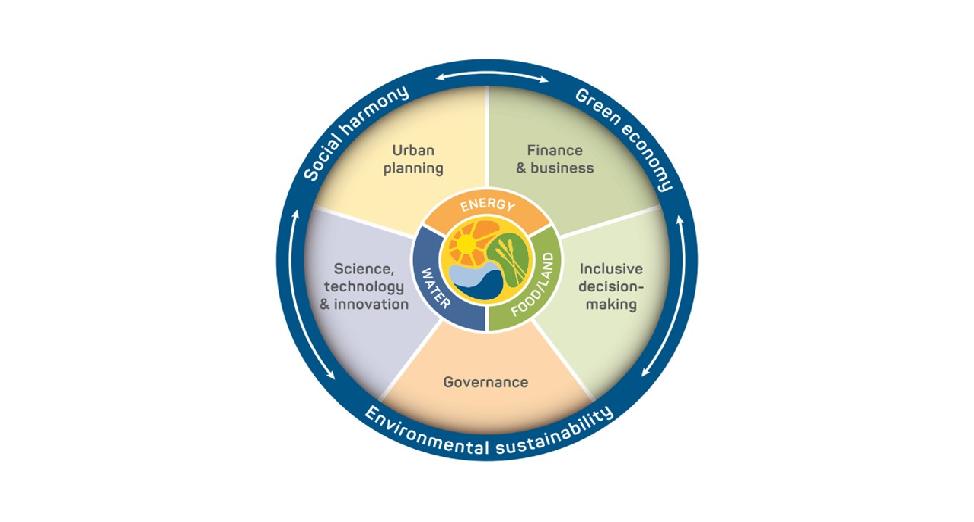
PUBLICATIONS

Provided by UNESCAP
For centuries, energy, water, food and land have been the major resources contributing to life as we know it and serving as the basis for establishing social structures and economic systems. The sustainable use of these resources is necessary for maintaining a sustainable equilibrium on our planet. However, overexploitation and resource-intensive growth patterns have highlighted the Asia-Pacific region’s vulnerability to resource volatilities, resulting in negative impacts on efforts to achieve poverty reduction, environmental integrity and ecological sustainability.
Profound economic development, population growth and urbanization combined have increased demand for limited natural resources. Rapid urbanization, particularly in the Asian and Pacific region where 60 percent of the world’s urban population resides, has been driving much of the demand for natural resources. The growth of cities is a key contributor to environmental degradation and climate change; however, cities provide the physical and institutional space where knowledge is created and diffused, infrastructure is developed, social structures are instituted, markets are established and interactions between people, technology, economy and environment are taking place. The Urban Nexus approach recognizes that cities must be part of the solution by examining and optimizing interdependencies and synergies between water, energy, food and land resources. The approach requires a shift from traditional, sectoral practices to cross-sectoral, integrated approaches that involve broad stakeholder and government engagement. Decoupling economic growth from environmental impact and valuing waste as a resource are fundamental to the Nexus concept.
Since 2013, our Integrated Resource Management in Asian Cities: The Urban Nexus project, supported by the German Federal Ministry for Economic Cooperation and Development (BMZ), has collaborated with representatives from 12 project cites and 7 countries to assess, design and implement innovative solutions in the areas of water supply, wastewater, energy and solid waste management. Several Nexus pilot investment projects costing less than $1 million have been implemented and financed by the project cities, resulting in improvements in residents’ lives and cost savings for the municipalities. Altogether more than 55 cross-sectoral investment projects amounting to $600 million have been jointly studied and elaborated, often still in the pipeline for financing. Dialogues, particularly between local and national levels of government, have laid the groundwork to introduce the required policy shifts needed to advance integrated resource management in cities, including to mainstream the Nexus approach into national initiatives for the implementation of the 2030 Agenda for Sustainable Development, the New Urban Agenda and the Paris Climate Agreement. Achieving national targets and global agenda commitments demands coordination and coherence with involved stakeholders from Governments, academic institutions, private sectors and civil societies, working together to ensure optimization of resource integration.
The Urban Nexus project evolved from initiating activities in project cities and increasing national-level engagement to collaborating with many sectors and groups, including youth and academia, to cultivate a mindset of lifelong learning needed to advance sustainable development. Many training institutes have already embraced transdisciplinary, integrated approaches in their curricula and teaching. Today’s youth are the leaders of tomorrow, and students, teachers and schools are natural multipliers needed to mainstream sustainable development values.
The ideas, partnerships, networks and activities that have been initiated through the Urban Nexus project offer great potential for cities to take forward integrated approaches and develop innovative policies to reduce resource consumption. Work must continue on regulatory and incentivizing instruments to guide transparent urban development and conscious use of our natural resources, and we must recognize that waste and wastewater, if managed well in the context of a circular economy, can be a prosperous income source and foster market opportunities. Mainstreaming the Urban Nexus approach can lead to entrepreneurial solutions to resource management throughout Asia and the Pacific.
We hope that this publication will become a substantive contribution to the growing dialogue, work and training to support further application of integrated resource management within the Asia-Pacific region and beyond.









